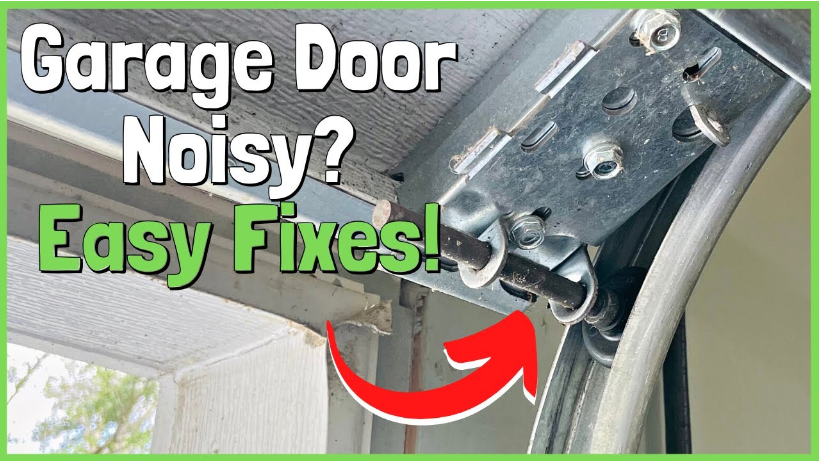Introduction
If your garage door makes loud noise when opening and closing, it could indicate worn-out rollers, loose hardware, or lack of lubrication. Addressing these issues early can prevent costly repairs and ensure smooth operation.

Common Causes of Garage Door Noise
Worn-out Rollers
Rollers play a crucial role in the smooth operation of your garage door. Over time, they can wear out or become misaligned, leading to squeaks and rattling sounds as the door moves.
Loose Hardware
Garage doors are subject to constant motion and vibration, which can cause screws, bolts, and other hardware to loosen. This results in a clattering or banging noise during operation.
Damaged Springs
The springs on your garage door bear the heavy weight of the door. When they become worn or broken, they may produce a loud popping or snapping sound.
Lack of Lubrication
A lack of lubrication on moving parts like hinges, rollers, and springs is a major cause of squeaky and grinding noises. Proper lubrication reduces friction and keeps the door running smoothly.
Misaligned Tracks
Tracks that are bent or misaligned can cause the rollers to grind against the metal, creating a loud screeching noise. This is often due to physical damage or improper installation.

Consequences of Ignoring a Noisy Garage Door
Increased Repair Costs
A noisy garage door might seem like a minor annoyance, but ignoring it can lead to bigger, more expensive problems. Small issues like loose hardware can evolve into major malfunctions if left unchecked.
Safety Hazards
A malfunctioning garage door can pose significant safety risks to you and your family. Broken springs or hardware can lead to sudden door failure, which can cause injuries or damage to your property.
Reduced Door Lifespan
Consistently operating a noisy door without addressing the underlying issues can put additional strain on its components, reducing its overall lifespan.
How to Diagnose the Noise
Identifying the Type of Noise
Different noises indicate different problems. A squeaking sound might point to lack of lubrication, while a grinding noise could indicate misaligned tracks. Pay attention to the type and location of the noise for clues.

Inspecting Hardware and Components
Take a close look at your garage door’s hardware, including rollers, tracks, and springs. Look for visible signs of wear, damage, or looseness. This inspection can help you pinpoint the source of the noise.
Fixing Common Garage Door Noises
Tightening Loose Parts
Use a wrench or screwdriver to tighten any loose bolts, screws, or brackets. Be careful not to over-tighten, as this can cause additional problems.
Lubricating Moving Parts
Apply a high-quality garage door lubricant to rollers, hinges, springs, and tracks. Avoid using WD-40, as it is not designed for long-lasting lubrication.
Replacing Damaged Components
If you notice worn-out rollers or broken springs, replace them promptly. For springs, it’s best to hire a professional due to the high tension they carry.
Preventing Garage Door Noise
Regular Maintenance Tips
Performing regular maintenance can keep your garage door in top condition. Check for loose hardware, clean the tracks, and lubricate all moving parts at least twice a year.
Choosing Quality Parts
Investing in high-quality parts like nylon rollers and durable springs can reduce noise and improve the overall performance of your garage door.
Scheduling Professional Inspections
Professional inspections can catch problems early, ensuring that your garage door operates quietly and efficiently for years to come.
When to Call a Professional
Signs Your Garage Door Needs Expert Help
If your garage door continues to make noise despite your efforts, or if you notice severe issues like broken springs or bent tracks, it’s time to call a professional.
Benefits of Professional Maintenance
Professionals have the tools and expertise to diagnose and fix complex problems. They can also provide valuable advice on maintaining your garage door.
Conclusion
A noisy garage door is more than just an annoyance—it’s a call for attention. By diagnosing the noise, addressing the root cause, and investing in regular maintenance, you can keep your garage door running smoothly and quietly for years to come. Don’t ignore the warning signs; tackle the problem head-on and enjoy the peace of mind that comes with a well-functioning garage door.
Frequently Asked Questions (FAQs)
What causes a garage door to make loud noises?
Common causes include worn-out rollers, loose hardware, damaged springs, lack of lubrication, and misaligned tracks.
Can I fix a noisy garage door myself?
Yes, you can tighten loose parts and lubricate moving components. However, for major issues like broken springs, it’s best to hire a professional.
How often should I lubricate my garage door?
Lubricate your garage door at least twice a year to ensure smooth and quiet operation.
Are noisy garage doors dangerous?
Yes, they can be. Noisy doors may indicate underlying problems that could lead to accidents or malfunctions if left unaddressed.
How much does it cost to fix a noisy garage door?
Repair costs vary depending on the issue, ranging from $100 for minor fixes to $500 or more for major repairs.

